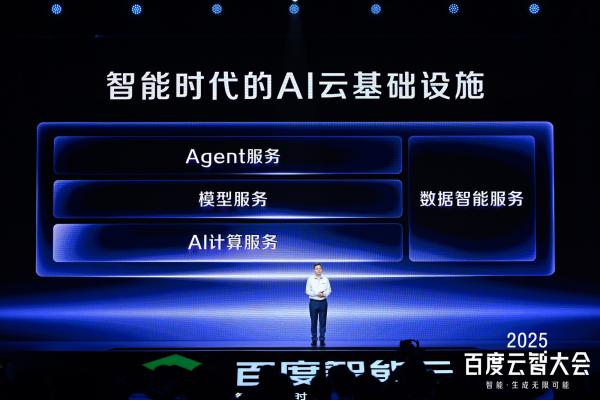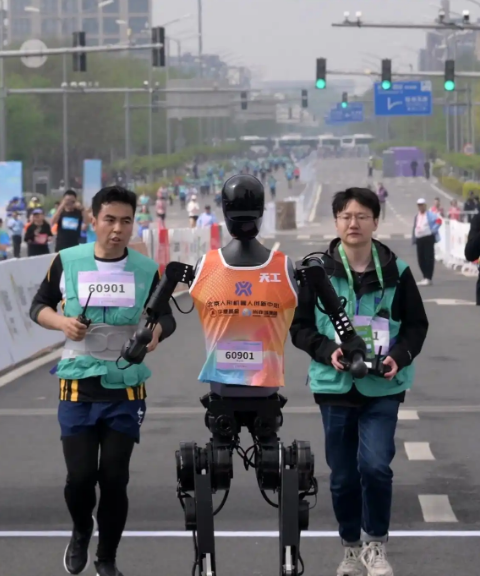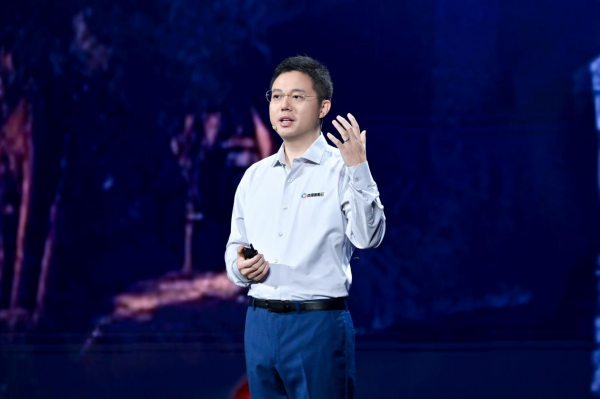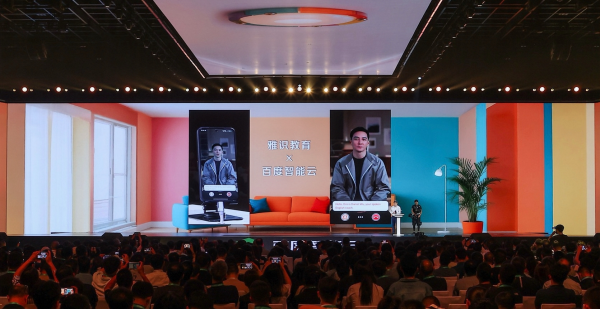Unlocking AI Era Industrial Dividends: Why Enterprises Choose Baidu
![]() 08/29 2025
08/29 2025
![]() 504
504
In the cloud computing landscape, full-stack technological prowess, ecological openness, and industry penetration depth have emerged as new competitive benchmarks, surpassing traditional card-stacking and resource-based competitions.

The advent of "Generative AI" has undeniably transformed cloud market competition.
At the 2025 Baidu Cloud Intelligence Conference, Shen Dou, Executive Vice President of Baidu Group and President of Baidu Intelligent Cloud Business Group, emphasized, "In the era of intelligent economy, new infrastructure must prioritize intelligence, epitomized by the AI Cloud."

Once CPUs reigned supreme in computing, but with Generative AI, GPUs have taken center stage due to their formidable computing capabilities. The shift from traditional CPU clusters to GPU clusters in the cloud service market is an unstoppable trend. As DeepSeek further ignites the AI market, cloud vendors' competition for AI intelligence has reached new heights, with enterprises demanding increasingly sophisticated "AI Cloud" capabilities from vendors.
However, AI's high technological complexity, cost, and long-term investment requirements mean that a significant portion of the future market will likely be dominated by a few cloud service providers with full-stack AI capabilities.
As the pioneer of the "AI Cloud" track, Baidu Intelligent Cloud has led China's AI public cloud market for six consecutive years, as of 2024.
The era of AI Agents is upon us. Baidu's unique full-stack technology and deep industrial insights make its cloud iteration trajectory a vital case study for observing AI's evolution among cloud vendors and the AI industry's future direction.
01 More Full-Stack, Easier to Use
What kind of intelligent economy era are we now witnessing?
Over the past three years, Generative AI has gradually permeated all aspects of economic life. Whether individuals fulfill their needs with AI, independent developers create "one-person companies" using AI, or enterprises reconstruct traditional businesses leveraging AI, the common demand from the model to the product end has spurred exponential growth in AI Cloud demand.
Unlike the previous CPU-driven public cloud market, where most enterprises today embrace AI, the high development threshold, complex model training and deployment, and increasing demand for computing power render self-exploration infeasible due to technical and financial costs. Thus, the demand for GPU-driven AI Cloud has emerged and continues to grow.
For cloud vendors, meeting the rising AI Cloud demand from customers necessitates continuous service efficiency improvements while reducing costs. For Baidu Intelligent Cloud, deeply entrenched in "Cloud-Intelligence Integration," this is the perfect battlefield for its full-stack technology.
At the August 28 Baidu Cloud Intelligence Conference, numerous AI foundation upgrades further reinforced Baidu Intelligent Cloud's "full-stack" approach:
For instance, the newly upgraded Baidu Baihe AI Computing Platform 5.0 boasts comprehensive enhancements in four key areas: networking, computing power, inference systems, and integrated training and inference systems, breaking the AI computing efficiency bottleneck.

Specifically, at the hardware computing power layer, the self-developed Kunlun chip-based "super node" public cloud service supports trillion-parameter large model operations with a single instance, compressing tasks previously requiring massive clusters to complete to the minute level, offering industry-leading computing power density.
Simultaneously, its inference system significantly improves throughput and response speed in high-concurrency scenarios through decoupled architecture, adaptive load balancing, and intelligent scheduling algorithms. The introduced integrated training and inference framework enables dynamic resource sharing and seamless switching between training and inference tasks, vastly enhancing overall computing efficiency.
The Baihe AI Computing Platform's upgrade has comprehensively lowered the thresholds and costs for large-scale AI model development and application, from underlying network communication to upper-level scheduling strategies. Industries like robotics, finance, and automobiles can now embrace AI more cost-effectively and efficiently.
It's worth noting that AI application scenarios like embodied intelligence are still nascent in "intelligence." A versatile intelligent platform with multi-ontology compatibility, multi-scenario adaptability, and robust generalization capabilities remains scarce in the industry.
In the Beijing Humanoid Robot Innovation Center's daily R&D process, Baidu Intelligent Cloud, leveraging its long-standing technical expertise in efficient computing power scheduling and model training and inference acceleration, provided high-performance, stable, and reliable AI infrastructure, significantly enhancing embodied model development efficiency.
Specifically, in constructing embodied "brain" capabilities, Baidu Intelligent Cloud utilizes the Qianfan large model platform and leading model capabilities, represented by the Wenxin large model 4.5, enabling the embodied "brain" to accurately parse natural language instructions and decompose complex tasks into executable subtask sequences through multimodal information fusion and contextual understanding, thus improving decision-making efficiency and accuracy.
This technology has been partially implemented in practical applications. On April 19, "Tiangong Ultra," a fully electric full-size humanoid robot under the Beijing Humanoid Robot Innovation Center, successfully completed the 2025 Beijing Yizhuang Half Marathon and Humanoid Robot Half Marathon with a time of 2 hours, 40 minutes, and 42 seconds. A new generation of products, "Tiangong 2.0," from the Beijing Humanoid Robot Innovation Center is poised for small-batch mass production applications.

Judging from the history of the "Cloud Intelligence Conference," the span and intensity of Baidu Intelligent Cloud's annual product updates have remained undiminished. As a 25-year-old AI giant, this reflects both Baidu's years of "Cloud-Intelligence Integration" accumulation and its formidable competitive "moat" in the cloud market.
02 "Cloud-Intelligence Integration" in the Agent Era
With the AI Agent era upon us, Generative AI is transforming from a "cost-reduction tool" to a "revenue-growth engine." As Shen Dou predicted at the 2025 Baidu Cloud Intelligence Conference, enterprises' infrastructure requirements have shifted from "cost reduction and efficiency enhancement" to "direct value creation" –
"All intelligence generated by computation will be encapsulated into Agents, participating in value creation and delivery. An enterprise's AI Cloud will no longer be a cost center but will become a new type of profit center."

On the broader software product front, AI Agents have become the focus of competition in the software service layer. For numerous real-world scenarios, simple chatting and question-answering are at best mere "toys." Agents that delve into complex industrial and commercial processes, transforming from "cost-reduction tools" to "revenue-growth engines," can truly generate commercial and social value.
Against this backdrop, Baidu Intelligent Cloud's Qianfan platform has officially been upgraded to a brand-new version 4.0, providing developers with enterprise-grade models, orchestration, and data capabilities required to create Agents.

From a model perspective, the Qianfan 4.0 model library has added over 150 models, including self-developed industry-specific models like Baidu's video generation model "Steam Engine," Qianfan Huijin financial industry models, and Qianfan VL visual understanding models (Qianfan-VL series), covering industry scenarios more comprehensively. Simultaneously, the RFT (Reinforcement Feedback Tuning) tool chain supports developers in achieving efficient model optimization with lower data volumes, significantly improving industry adaptability and training efficiency.
In terms of platform capabilities, Qianfan 4.0, built on multimodal RAG (Retrieval Augmented Generation), not only supports traditional text retrieval but also extends to multimodal content like images, tables, PDFs, and structured data, comprehensively covering diverse enterprise knowledge forms.
The newly upgraded computing power and development platform also host numerous "out-of-the-box" Agent applications awaiting user exploration, such as the digital employee "AI Wu Yanzu" and the "AI Master Craftsman" based on Huiboxing digital human technology.
The "AI Master Craftsman" refers to the process compliance analysis capability in the "Yijian Visual Large Model Platform." Users only need to upload a standard operation video, and an SOP (Standard Operating Procedure) detection task can be generated within minutes. This can effectively alleviate issues like skilled technician shortages and experience inheritance difficulties in industrial production lines, truly helping enterprises achieve cost reduction and efficiency enhancement through AI.
Taking China Iron and Steel Research Institute (CISRI) as an example, they have collaborated with Baidu Intelligent Cloud to build an AI large model platform covering the entire material research, development, and manufacturing process, leveraging Baidu's Qianfan, Baihe, Yijian, and other platforms' core capabilities. This is also the first process perception large model in the metallurgical industry, achieving a key breakthrough in AI applications within this field.
In actual metallurgical industry scenarios, complex data types are the norm. However, empowered by the AI Cloud, many previously labor-intensive processes have achieved considerable AI intelligence: the MIOU of the metallographic analysis large model exceeds 90%, with a 97.3% accuracy rate; the surface defect detection model processes 2,000 images every 100 seconds with an accuracy rate exceeding 95%; material tracking responds in just 100ms with a tracking accuracy exceeding 95%. Multiple indicators have reached industry-leading levels, truly realizing AI-driven business innovation.
Currently, relevant achievements have been implemented in metallographic automatic report generation, hot-rolled surface inspection workflow, slab cross-field trajectory tracking, and other links, significantly enhancing CISRI's R&D and production efficiency, and becoming a core example of collaborative industrial intelligence promotion between the real economy and technology enterprises.
Additionally, Baidu Intelligent Cloud has collaborated with AI education customer Yes Education to launch "AI Wu Yanzu Digital English Coach," built on Baidu's self-developed end-to-end speech and semantics large model and a full suite of AI capabilities like Huiboxing digital human technology. From today, the AI Wu Yanzu digital human will officially debut as the first batch of recommendation officers in Baidu Intelligent Cloud's digital employee system.

03 Where Lies the Real Barrier to Cloud Services?
Today, competition in China's AI cloud market has entered deep waters. From the early stages of "going to the cloud" to today's "going to AI," there has been a fundamental shift in enterprise demand. According to the latest IDC report, China's AI public cloud service market reached 19.59 billion yuan in 2024, with a 55.3% year-on-year growth, but market concentration continues to rise, with the head effect becoming more pronounced: the combined market share of CR4 (the top four vendors) exceeds 91.3%, presenting a typical "pyramid" structure.
In this landscape, full-stack technological capabilities, ecological openness, and industry penetration depth have replaced traditional card-stacking and resource-based competitions, becoming new competitive barriers for cloud vendors.
As Xin Zhou, General Manager of Baidu Intelligent Cloud's AI and Large Model Platform, stated, enterprise demand has reached a "next level":
"Last year and the year before, our primary demand was that the model must rank in the top three on the leaderboard, and the model parameters must reach the 100 billion level. But this year, it has become very practical. Customers no longer care about whether the platform is the most advanced but require stable operation, model security, data security, etc."
Baidu Intelligent Cloud's strategic determination is evident in its long-term investment in "Cloud-Intelligence Integration."
Since initiating cloud services in 2015, Baidu Intelligent Cloud has delineated a clear development strategy centered around the "trinity" of Artificial Intelligence (AI), Big Data, and Cloud Computing. By 2020, the notion of "Cloud-Intelligence Integration" was firmly established. Today, Baidu Intelligent Cloud's architecture has undergone a further enhancement, ushering in a new era of AI cloud infrastructure that prioritizes intelligence and integrates cloud and intelligence seamlessly. This infrastructure aims to serve as a robust foundation for the systematic integration of China's AI industry. Baidu consistently views AI as the cornerstone of its cloud services' distinct advantage.
This unwavering commitment has yielded substantial dividends: Baidu Intelligent Cloud has topped China's AI public cloud market for six straight years. In the first half of 2025, among large model-related projects in China, Baidu Intelligent Cloud led both in the number of winning bids (48 projects) and the total value of winning bids (510 million yuan), maintaining its dominance in key sectors such as finance, energy, government affairs, and manufacturing.
To date, over 65% of central enterprises have opted for Baidu Intelligent Cloud for large model deployment. Additionally, 80% of systemically important banks, more than 150 insurance, securities, and fund companies, all top 10 mobile phone manufacturers, 95% of mainstream automakers, over 50% of game manufacturers, and a significant number of key embodied intelligence enterprises have chosen Baidu Intelligent Cloud for their large model needs.

From "intelligent emergence" to "AI integration," Baidu's "Cloud-Intelligence Integration" has reached a pivotal stage of large-scale empowerment. Its core strengths now rest not just on technological leadership but on a formidable triple barrier encompassing technology, ecology, and industry.
In the new era of the intelligent economy, Baidu Intelligent Cloud is demonstrating through tangible industrial empowerment that AI has transcended being merely a skill-showcasing tool and has become a pivotal engine propelling the high-quality development of the real economy. The competition in cloud services will ultimately boil down to a competition of value creation capabilities – and this is where Baidu's deepest competitive advantage lies.







